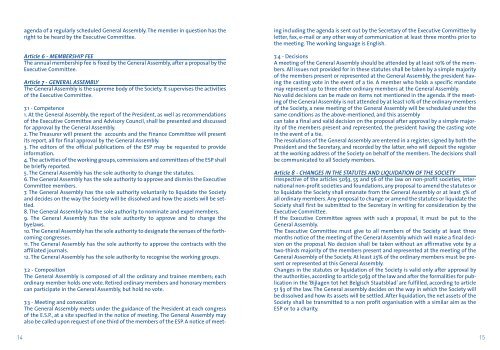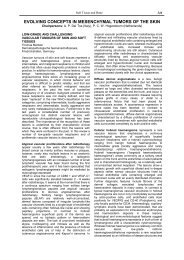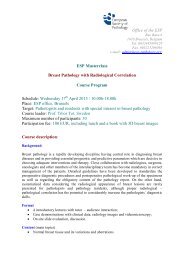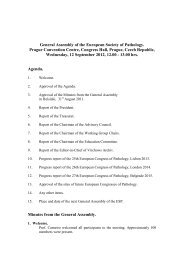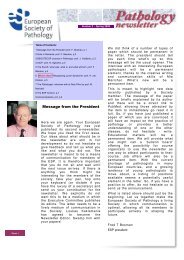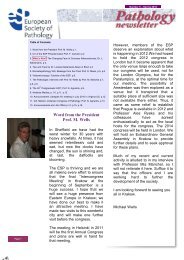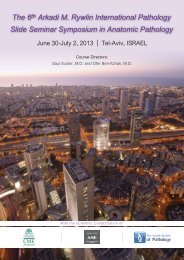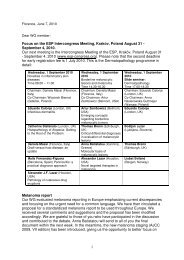BlueBook 2009.qxd:1 - European Society of Pathology
BlueBook 2009.qxd:1 - European Society of Pathology
BlueBook 2009.qxd:1 - European Society of Pathology
You also want an ePaper? Increase the reach of your titles
YUMPU automatically turns print PDFs into web optimized ePapers that Google loves.
14<br />
agenda <strong>of</strong> a regularly scheduled General Assembly. The member in question has the<br />
right to be heard by the Executive Committee.<br />
Article 6 - MEMBERSHIP FEE<br />
The annual membership fee is fixed by the General Assembly, after a proposal by the<br />
Executive Committee.<br />
Article 7 - GENERAL ASSEMBLY<br />
The General Assembly is the supreme body <strong>of</strong> the <strong>Society</strong>. It supervises the activities<br />
<strong>of</strong> the Executive Committee.<br />
7.1 - Competence<br />
1. At the General Assembly, the report <strong>of</strong> the President, as well as recommendations<br />
<strong>of</strong> the Executive Committee and Advisory Council, shall be presented and discussed<br />
for approval by the General Assembly.<br />
2. The Treasurer will present the accounts and the Finance Committee will present<br />
its report, all for final approval by the General Assembly.<br />
3. The editors <strong>of</strong> the <strong>of</strong>ficial publications <strong>of</strong> the ESP may be requested to provide<br />
information.<br />
4. The activities <strong>of</strong> the working groups, commissions and committees <strong>of</strong> the ESP shall<br />
be briefly reported.<br />
5. The General Assembly has the sole authority to change the statutes.<br />
6. The General Assembly has the sole authority to approve and dismiss the Executive<br />
Committee members.<br />
7. The General Assembly has the sole authority voluntarily to liquidate the <strong>Society</strong><br />
and decides on the way the <strong>Society</strong> will be dissolved and how the assets will be settled.<br />
8. The General Assembly has the sole authority to nominate and expel members.<br />
9. The General Assembly has the sole authority to approve and to change the<br />
byelaws.<br />
10. The General Assembly has the sole authority to designate the venues <strong>of</strong> the forthcoming<br />
congresses.<br />
11. The General Assembly has the sole authority to approve the contracts with the<br />
affiliated journals.<br />
12. The General Assembly has the sole authority to recognise the working groups.<br />
7.2 - Composition<br />
The General Assembly is composed <strong>of</strong> all the ordinary and trainee members; each<br />
ordinary member holds one vote. Retired ordinary members and honorary members<br />
can participate in the General Assembly, but hold no vote.<br />
7.3 - Meeting and convocation<br />
The General Assembly meets under the guidance <strong>of</strong> the President at each congress<br />
<strong>of</strong> the E.S.P., at a site specified in the notice <strong>of</strong> meeting. The General Assembly may<br />
also be called upon request <strong>of</strong> one third <strong>of</strong> the members <strong>of</strong> the ESP. A notice <strong>of</strong> meet-<br />
ing including the agenda is sent out by the Secretary <strong>of</strong> the Executive Committee by<br />
letter, fax, e-mail or any other way <strong>of</strong> communication at least three months prior to<br />
the meeting. The working language is English.<br />
7.4 - Decisions<br />
A meeting <strong>of</strong> the General Assembly should be attended by at least 10% <strong>of</strong> the members.<br />
All issues not provided for in these statutes shall be taken by a simple majority<br />
<strong>of</strong> the members present or represented at the General Assembly, the president having<br />
the casting vote in the event <strong>of</strong> a tie. A member who holds a specific mandate<br />
may represent up to three other ordinary members at the General Assembly.<br />
No valid decisions can be made on items not mentioned in the agenda. If the meeting<br />
<strong>of</strong> the General Assembly is not attended by at least 10% <strong>of</strong> the ordinary members<br />
<strong>of</strong> the <strong>Society</strong>, a new meeting <strong>of</strong> the General Assembly will be scheduled under the<br />
same conditions as the above-mentioned, and this assembly<br />
can take a final and valid decision on the proposal after approval by a simple majority<br />
<strong>of</strong> the members present and represented, the president having the casting vote<br />
in the event <strong>of</strong> a tie.<br />
The resolutions <strong>of</strong> the General Assembly are entered in a register, signed by both the<br />
President and the Secretary, and recorded by the latter, who will deposit the register<br />
at the working address <strong>of</strong> the <strong>Society</strong> on behalf <strong>of</strong> the members. The decisions shall<br />
be communicated to all <strong>Society</strong> members.<br />
Article 8 - CHANGES IN THE STATUTES AND LIQUIDATION OF THE SOCIETY<br />
Irrespective <strong>of</strong> the articles 50§3, 55 and 56 <strong>of</strong> the law on non-pr<strong>of</strong>it societies, international<br />
non-pr<strong>of</strong>it societies and foundations, any proposal to amend the statutes or<br />
to liquidate the <strong>Society</strong> shall emanate from the General Assembly or at least 5% <strong>of</strong><br />
all ordinary members. Any proposal to change or amend the statutes or liquidate the<br />
<strong>Society</strong> shall first be submitted to the Secretary in writing for consideration by the<br />
Executive Committee.<br />
If the Executive Committee agrees with such a proposal, it must be put to the<br />
General Assembly.<br />
The Executive Committee must give to all members <strong>of</strong> the <strong>Society</strong> at least three<br />
months notice <strong>of</strong> the meeting <strong>of</strong> the General Assembly which will make a final decision<br />
on the proposal. No decision shall be taken without an affirmative vote by a<br />
two-thirds majority <strong>of</strong> the members present and represented at the meeting <strong>of</strong> the<br />
General Assembly <strong>of</strong> the <strong>Society</strong>. At least 25% <strong>of</strong> the ordinary members must be present<br />
or represented at this General Assembly.<br />
Changes in the statutes or liquidation <strong>of</strong> the <strong>Society</strong> is valid only after approval by<br />
the authorities, according to article 50§3 <strong>of</strong> the law and after the formalities for publication<br />
in the ‘Bijlagen tot het Belgisch Staatsblad’ are fulfilled, according to article<br />
51 §3 <strong>of</strong> the law. The General assembly decides on the way in which the <strong>Society</strong> will<br />
be dissolved and how its assets will be settled. After liquidation, the net assets <strong>of</strong> the<br />
<strong>Society</strong> shall be transmitted to a non pr<strong>of</strong>it organisation with a similar aim as the<br />
ESP or to a charity.<br />
15


